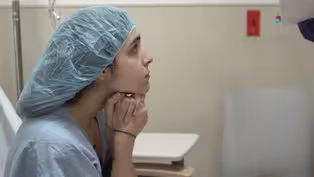
Limitations of Treatment
Clip: Episode 1 | 4m 41sVideo has Closed Captions
Treatments for endometriosis are difficult to navigate and often come with side effects.
Treatments for endometriosis are difficult to navigate and often come with side effects. First, patients are often offered pain medication and hormonal medications. These medications are band-aids that do not treat the underlying disease. Then, they are offered surgery, yet most OBGYNs are ill-equipped to provide the advanced surgery necessary to properly treat endometriosis.
Problems playing video? | Closed Captioning Feedback
Problems playing video? | Closed Captioning Feedback

Limitations of Treatment
Clip: Episode 1 | 4m 41sVideo has Closed Captions
Treatments for endometriosis are difficult to navigate and often come with side effects. First, patients are often offered pain medication and hormonal medications. These medications are band-aids that do not treat the underlying disease. Then, they are offered surgery, yet most OBGYNs are ill-equipped to provide the advanced surgery necessary to properly treat endometriosis.
Problems playing video? | Closed Captioning Feedback
How to Watch Below the Belt: The Last Health Taboo
Below the Belt: The Last Health Taboo is available to stream on pbs.org and the free PBS App, available on iPhone, Apple TV, Android TV, Android smartphones, Amazon Fire TV, Amazon Fire Tablet, Roku, Samsung Smart TV, and Vizio.
(gentle music) - I feel nervous, I'm not gonna lie.
This is a definitive point on what we do next, and what we do next is not a good option.
They all have side effects, so we're just feeling like she's okay.
She's not great on what she's doing now, but she's okay and if we switch it up, she might not be okay.
And that's the scary thing.
Just watching her.
- Are you sure that's right?
- 90 pounds?
- Almost 94.
- 94.
- 94 pounds, Seriously, so she's dropped almost 10 pounds in the last... - [Nurse] 93.72.
- Oh my gosh, that is really low.
- Yeah.
- [Nurse] Ready, Emily?
- Okay.
- All right, love you.
It is like a weird feeling to be here, I have to say like, I think I get anxiety.
(sobbing) Ugh.
It's like you get going on a great trajectory, you know, it's like just goes great for a while and then when you have to mix it up, it gets scary.
(gentle music) - [Jenneh] If medications don't work, the next step is usually to have surgery.
- [Receptionist] Perfect, let's have you fill this in.
- Okay, thanks.
So I went to my OBGYN.
He did what's called an ablation surgery, where he burned the endometriosis out.
- [Nurse] How are you doing today?
- [Jenneh] Good, doing better.
- I think my surgery lasted about 40 minutes and my doctor actually told me that when I woke up for anesthesia, he told me everything looked good, we didn't see anything.
And then four days after my ablation, I got my first period and it was just excruciating.
And I just remember thinking whatever he did didn't work, 'cause this feels exactly the same as it did before.
(gentle music) - Ideally, all endometriosis lesions should be excised.
Adequate surgical excision of endometrial implants provides the best symptomatic relief and long-term results.
Unfortunately, most gynecologists are not trained in advanced endometriosis cases, so they're doing ablation, the burning.
- I'm not gonna lie to you, like it freaks me out that I have to get another surgery.
Like I already have scars from my other two and it was a horrible recovery.
- [Mary Alice] I know.
- Surgery is really scary.
- Only a small handful of physicians are able to perform excision of endometriosis, it takes a lot of training.
It's actually very difficult to excise endometriosis because often you're on the bowel, on the bladder, on the ureters.
(gentle music) - [Narrator] The whole system is broken.
Women are caught up in this endless cycle of drugs and ineffective surgeries.
And until we have better treatments and better research from unbiased sources, this is never going to stop.
Video has Closed Captions
Clip: Ep1 | 5m 9s | Those with endometriosis symptoms see 8 doctors over 10 years on average before diagnosis. (5m 9s)
Video has Closed Captions
Preview: Ep1 | 30s | Examine the problems in our healthcare system that disproportionately affect women. (30s)
Providing Support for PBS.org
Learn Moreabout PBS online sponsorship
- News and Public Affairs

Top journalists deliver compelling original analysis of the hour's headlines.

- News and Public Affairs

FRONTLINE is investigative journalism that questions, explains and changes our world.












Support for PBS provided by:

